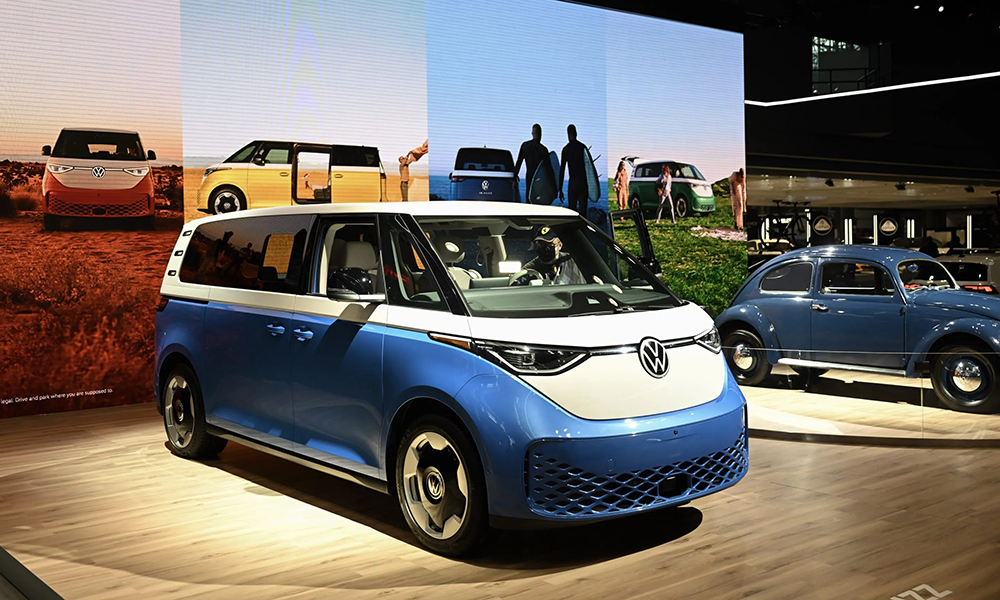
周一公布的官方数据显示,去年德国新电动汽车销量大幅下滑,向电池动力汽车的缓慢转型加剧了该国旗舰汽车行业的困境。
德国联邦汽车运输管理局(KBA)表示,2024年欧洲最大的汽车市场仅有380609辆电动汽车注册,比上年减少27.4%。
在经历多年增长之后,随着德国经济陷入困境以及关键补贴取消,对电池动力汽车的需求明显放缓。
安永(EY)分析师康斯坦丁·高尔(Constantin Gall)表示,电动汽车销量的下滑相当于“电动汽车失去的一年”。
他表示,由于政府预算危机,支持计划于2023年突然终止,导致“潜在购车者存在巨大的不确定性”。
他表示,新电动汽车车型的高昂价格、充电基础设施仍不完善以及续航里程的限制,让德国的新购车者望而却步。
电动汽车销量下降导致德国汽车市场整体下滑,自疫情以来,德国汽车市场一直在努力恢复。
2024年,欧洲第一大经济体共售出约280万辆新车,比上一年减少1%。
行业困境
德国国内新车需求疲软,加上生产成本高企和来自中国的竞争日益激烈,加剧了德国汽车业面临的挑战。
欧洲最大的汽车制造商大众汽车(Volkswagen)去年年底宣布与工会达成协议,将在德国削减约73万辆汽车产能,并裁员3.5万人。
大众汽车表示,需要大幅削减产能,以使其核心品牌实现可持续发展,并为该制造商陷入困境的电动化战略投资提供资金。
尽管大众汽车陷入困境,但它依然凭借在德国市场536888辆新车的注册量,保持着销量冠军的地位。
中国制造商在本土市场攫取了大量市场份额,令欧洲制造商感到恐慌,但它们尚未在德国取得重大进展。
比亚迪(BYD)、小鹏(XPeng)和上汽荣威(MG Roewe)等品牌在德国的总销量约为2.5万辆。
特斯拉(Tesla)的市场份额也从2.2%下降到1.3%,因为这家美国电动汽车制造商在德国的销量仅为38000辆。
德国电动汽车销量的整体下滑,使得相较于传统内燃机汽车和混合动力汽车,电池动力汽车的市场份额有所减少。
2024年,电动汽车占总销量的13.5%,低于上一年的18.4%。
混合动力汽车销量增长12.7%,达到近95万辆,这反映出消费者倾向于购买既能使用电力又能使用化石燃料的汽车,以此作为对冲风险的一种策略。
补贴计划
高尔表示,需要“强大的推动力”来重振电动汽车市场。
他表示,一项新支持计划可能“极大地推动”电动汽车的销售,但由于德国将于2月23日举行新大选,前景依然充满不确定性。
德国总理奥拉夫·朔尔茨(Olaf Scholz)领导的政府取消了此前的补贴计划,他在竞选活动中呼吁在欧洲层面推出新支持计划。
反对党政界人士也呼吁为境况不佳的汽车业提供更多援助,并对欧洲逐步淘汰内燃机汽车的计划提出了批评。
高尔表示,制造商可能会自行降价,以期提升电动汽车的销量,并确保在2025年更严格的欧盟排放标准生效时达标。
他表示,电动汽车价格下调举措可能会带动销量增长,但该行业将难以超越2023年的销量水平。
高尔还补充说,消费者青睐的“期望中的范式转变”尚未到来,“对于大多数人而言,内燃机汽车仍然比电动汽车更受欢迎”。(财富中文网)
译者:中慧言-王芳
周一公布的官方数据显示,去年德国新电动汽车销量大幅下滑,向电池动力汽车的缓慢转型加剧了该国旗舰汽车行业的困境。
德国联邦汽车运输管理局(KBA)表示,2024年欧洲最大的汽车市场仅有380609辆电动汽车注册,比上年减少27.4%。
在经历多年增长之后,随着德国经济陷入困境以及关键补贴取消,对电池动力汽车的需求明显放缓。
安永(EY)分析师康斯坦丁·高尔(Constantin Gall)表示,电动汽车销量的下滑相当于“电动汽车失去的一年”。
他表示,由于政府预算危机,支持计划于2023年突然终止,导致“潜在购车者存在巨大的不确定性”。
他表示,新电动汽车车型的高昂价格、充电基础设施仍不完善以及续航里程的限制,让德国的新购车者望而却步。
电动汽车销量下降导致德国汽车市场整体下滑,自疫情以来,德国汽车市场一直在努力恢复。
2024年,欧洲第一大经济体共售出约280万辆新车,比上一年减少1%。
行业困境
德国国内新车需求疲软,加上生产成本高企和来自中国的竞争日益激烈,加剧了德国汽车业面临的挑战。
欧洲最大的汽车制造商大众汽车(Volkswagen)去年年底宣布与工会达成协议,将在德国削减约73万辆汽车产能,并裁员3.5万人。
大众汽车表示,需要大幅削减产能,以使其核心品牌实现可持续发展,并为该制造商陷入困境的电动化战略投资提供资金。
尽管大众汽车陷入困境,但它依然凭借在德国市场536888辆新车的注册量,保持着销量冠军的地位。
中国制造商在本土市场攫取了大量市场份额,令欧洲制造商感到恐慌,但它们尚未在德国取得重大进展。
比亚迪(BYD)、小鹏(XPeng)和上汽荣威(MG Roewe)等品牌在德国的总销量约为2.5万辆。
特斯拉(Tesla)的市场份额也从2.2%下降到1.3%,因为这家美国电动汽车制造商在德国的销量仅为38000辆。
德国电动汽车销量的整体下滑,使得相较于传统内燃机汽车和混合动力汽车,电池动力汽车的市场份额有所减少。
2024年,电动汽车占总销量的13.5%,低于上一年的18.4%。
混合动力汽车销量增长12.7%,达到近95万辆,这反映出消费者倾向于购买既能使用电力又能使用化石燃料的汽车,以此作为对冲风险的一种策略。
补贴计划
高尔表示,需要“强大的推动力”来重振电动汽车市场。
他表示,一项新支持计划可能“极大地推动”电动汽车的销售,但由于德国将于2月23日举行新大选,前景依然充满不确定性。
德国总理奥拉夫·朔尔茨(Olaf Scholz)领导的政府取消了此前的补贴计划,他在竞选活动中呼吁在欧洲层面推出新支持计划。
反对党政界人士也呼吁为境况不佳的汽车业提供更多援助,并对欧洲逐步淘汰内燃机汽车的计划提出了批评。
高尔表示,制造商可能会自行降价,以期提升电动汽车的销量,并确保在2025年更严格的欧盟排放标准生效时达标。
他表示,电动汽车价格下调举措可能会带动销量增长,但该行业将难以超越2023年的销量水平。
高尔还补充说,消费者青睐的“期望中的范式转变”尚未到来,“对于大多数人而言,内燃机汽车仍然比电动汽车更受欢迎”。(财富中文网)
译者:中慧言-王芳
Sales of new electric vehicles in Germany plunged last year, official figures showed Monday, as a slow switch to battery-powered cars deepened the woes of the country’s flagship auto industry.
Just 380,609 EVs were registered in 2024 in Europe’s largest auto market, 27.4 percent fewer than in the previous year, the KBA federal transport authority said.
After years of growth, demand for battery-powered cars lost momentum as the German economy has struggled and key subsidies were withdrawn.
The slump in EV sales amounted to a “lost year for electro-mobility”, said EY analyst Constantin Gall.
The sudden end of the support programme in 2023 amid a government budget crisis had led to “massive uncertainty among potential buyers”, he said.
High prices for new EV models, still patchy charging infrastructure and range limitations were putting off new buyers in Germany, he said.
The drop in EV sales led an overall decline in the German car market, which has struggled to recover since the coronavirus pandemic.
Some 2.8 million new cars were sold in 2024 in Europe’s top economy, one percent fewer than in the previous year.
Industry struggles
Weak demand for new cars at home has compounded the challenges facing Germany’s auto industry, alongside high production costs and rising competition from China.
Europe’s biggest carmaker Volkswagen announced a deal with unions at the end of last year to reduce production capacity in Germany by some 730,000 units and cut 35,000 jobs.
The drastic cuts were needed to put the core Volkswagen brand on a sustainable footing and to fund investments in the manufacturer’s struggling electric strategy, the group said.
The difficulties at VW did not stop it from keeping the top spot in sales with 536,888 new registrations in Germany.
Chinese manufacturers who have gobbled up market share in their domestic market and spooked European producers have yet to make major inroads in Germany.
Combined, brands such as BYD, XPeng and MG Roewe sold some 25,000 units in Germany.
Tesla’s market share also dropped to 1.3 percent from 2.2 percent, as the US electric vehicle maker shifted only 38,000 units in Germany.
The overall slump in electric car sales in Germany saw battery-powered vehicles lose market share relative to traditional combustion engines and hybrid cars.
Electric cars made up 13.5 percent of sales in 2024, down from 18.4 percent in the previous year.
Sales of hybrid cars rose by 12.7 percent to almost 950,000 as consumers looked to hedge their bets with cars than can run on both electricity and fossil fuel.
Subsidy scheme
Gall said “strong impulses” were needed to kickstart the electric car market.
A new support programme could provide a “significant boost” to sales of battery-powered cars, he said, but remained uncertain about the outlook as Germany is headed for new elections on February 23.
Chancellor Olaf Scholz, whose government scrapped the previous subsidy scheme, has called on the campaign trail for a new support programme on the European level.
Opposition politicians have also called for the ailing auto industry to get more assistance, while criticising European plans to phase out combustion engines.
Manufacturers could cut prices themselves as they look to shift more EVs and stay on track to meet stricter EU emissions targets coming into force in 2025, Gall said.
Progress in bringing down EV prices could lead to a rise in sales, but the sector would struggle to rise above volumes seen in 2023, he said.
A “hoped-for paradigm shift” in consumer preferences had yet to come, Gall added. “For large parts of the population, combustion engines remain significantly more popular than electric cars.”






